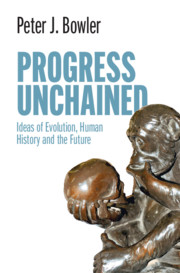1 - Introduction
Ladders and Trees
Published online by Cambridge University Press: 11 February 2021
Summary
This introduction outlines a new interpretation of the history of the idea of progress, focusing on the transition from a goal-directed model to an open-ended view in which there can be multiple forms of improvement. Developments in thinking about the history of life on earth are used as a guide to wider changes in the perception of how progress can operate. Early ideas based on the chain of being saw humanity as the goal of biological evolution, just as the first theories of social progress saw it as the ascent of a linear hierarchy of steps towards a future paradise or utopia. Darwinism transformed evolutionism by introducing the image of a branching 'tree of life' with no single goal of progress. Parallels to this transformation can be seen in twentieth-century approaches to human history and predictions of multiple possible futures based on the unpredictability of technological innovations. Progress has become less clear-cut and more open to criticism by those who reject the utilitarian basis of technological advance.
- Type
- Chapter
- Information
- Progress UnchainedIdeas of Evolution, Human History and the Future, pp. 1 - 24Publisher: Cambridge University PressPrint publication year: 2021

